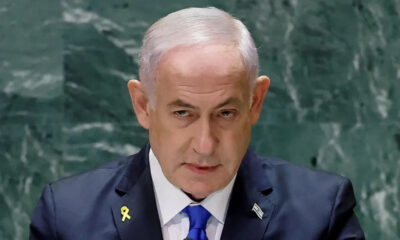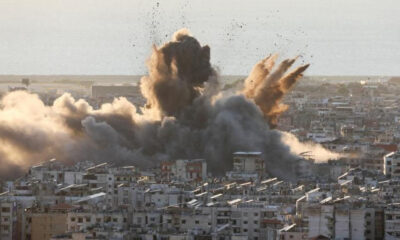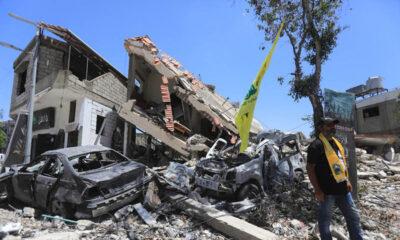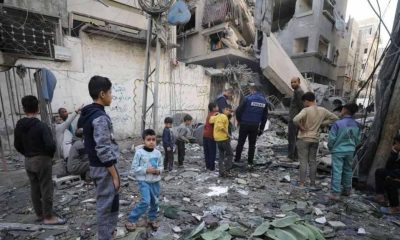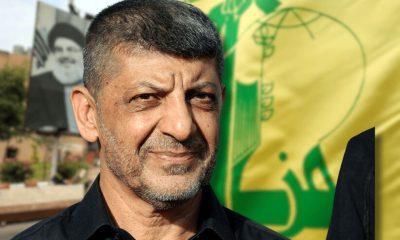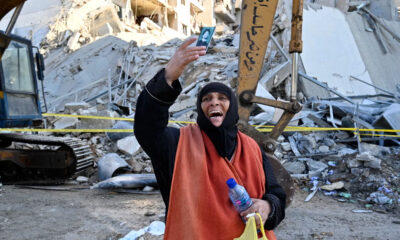International
Israel says 100 Hezbollah rocket launchers hit in Lebanon
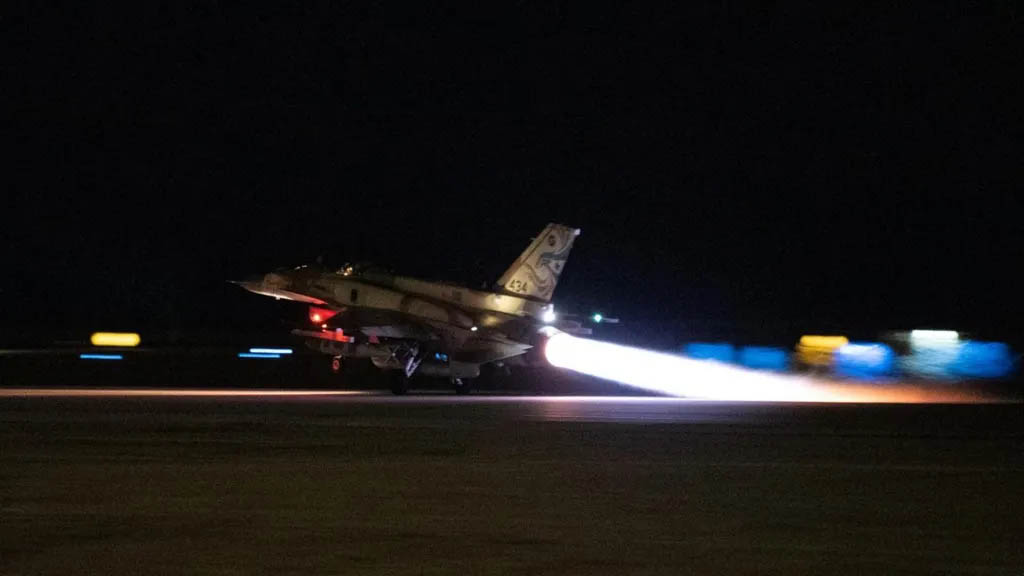
Israel says 100 Hezbollah rocket launchers hit in Lebanon
Israel has carried out extensive air strikes on southern Lebanon, saying its warplanes have hit more than 100 Hezbollah rocket launchers and other “terrorist sites” including a weapons storage facility.
The Israel Defense Forces (IDF) said the launchers were ready to be fired against Israel. It was not immediately clear if there were any casualties.
Lebanon’s state-run National News Agency said Israel carried out at least 52 strikes in the south of the country on Thursday evening, and that Lebanon had also launched strikes on military sites in northern Israel.
Earlier, Hezbollah leader Hassan Nasrallah said deadly explosions earlier in the week “crossed all red lines”, accusing Israel of what he said represented a declaration of war.
Israel has not said it was behind the attacks – which saw pagers and walkie-talkies explode simultaneously across the country – on Tuesday and Wednesday, and which Lebanese authorities said killed 37 people and wounded 3,000.
But Defence Minister Yoav Gallant has said Israel is embarking on a “new phase of the war”, concentrating more of its efforts on the north.
The previously sporadic cross-border fighting escalated on 8 October 2023 – the day after the unprecedented attack on Israel by Hamas gunmen from Gaza – when Hezbollah fired at Israeli positions, in solidarity with the Palestinians.
Since then hundreds of people, most of them Hezbollah fighters, have been killed in the cross-border fighting, and tens of thousands have also been displaced on both sides of the border.
Hezbollah has said it is acting in support of the Palestinian armed group Hamas. Both are backed by Iran and proscribed as terrorist organisations by Israel, the UK and other countries.
READ ALSO:
- Gaza ceasefire deal unlikely in Biden’s term, WSJ reports
- Israeli planes bomb southern Lebanon after radio blasts
- Edo polls and the famous product vendor, by Azu Ishiekwene
In a statement late on Thursday, the IDF said its warplanes “struck approximately 100 launchers and additional terrorist infrastructure sites, consisting of approximately 1,000 barrels that were ready to be used in the immediate future to fire toward Israeli territory”.
“The IDF will continue to operate to degrade the Hezbollah terrorist organisation’s infrastructure and capabilities in order to defend the state of Israel”.
Lebanese security sources cited by Reuters news agency and the New York Times said the Israeli strikes were one of the most intense since the war in Gaza began in October last year.
The IDF also urged residents in northern Israel close to the Lebanese border to avoid large gatherings, guard their neighbourhoods and stay close to bomb shelters.
On Thursday morning, Hezbollah fighters in southern Lebanon fired two anti-tank missiles across the border, followed by drones.
The IDF said two Israeli soldiers were killed and a third seriously wounded.
In his televised address on Thursday, Hassan Nasrallah said of Tuesday and Wednesday’s attacks: “The enemy crossed all rules, laws and red lines. It didn’t care about anything at all, not morally, not humanely, not legally.”
“This is massacre, a major aggression against Lebanon, its people, its resistance, its sovereignty, and its security. It can be called war crimes or a declaration of war – whatever you choose to name it, it is deserving and fits the description. This was the enemy’s intention,” he added.
As Nasrallah spoke, Israeli warplanes caused sonic booms over Beirut, scaring an already-exhausted population, and others struck targets in southern Lebanon.
The Hezbollah leader acknowledged that this was a massive and unprecedented blow for his group, but he insisted that its ability to command and communicate remained intact.
Nasrallah’s tone was defiant and he vowed a harsh punishment. But, again, he indicated that Hezbollah was not interested in an escalation of its current conflict with Israel.
READ ALSO:
- NCC moves to boost internet speed with 6GHz spectrum
- Pension bill: Police retirees to embark on protest
- Actress Adunni Ade speaks on cab driver lawsuit threat
The group’s cross-border attacks, he said, were going to continue unless there was a ceasefire in Gaza, and that no killings or assassinations would return residents to northern Israel.
The IDF said on Thursday that its chief of staff, Lt Gen Herzi Halevi, had “recently completed approval of plans for the northern arena”.
Gallant later said that “in the new phase of the war there are significant opportunities but also significant risks”.
“Hezbollah feels that it is being persecuted and the sequence of military actions will continue,” he added.
“Our goal is to ensure the safe return of Israel’s northern communities to their homes. As time goes by, Hezbollah will pay an increasing price.”
It is not clear how Israel intends to achieve this goal. But reports earlier this week suggested that the general in charge of the IDF’s Northern Command favoured the creation of an Israeli-controlled buffer zone inside southern Lebanon.
US Secretary of State Antony Blinken called for restraint on all sides.
“We don’t want to see any escalatory actions by any party” that would make the goal of achieving a ceasefire in Gaza more difficult, he said as he joined European foreign ministers in Paris to discuss the widening crisis.
UK Foreign Secretary David Lammy, who was also at the talks in Paris, called for an immediate ceasefire between Israel and Hezbollah.
“We are all very, very clear that we want to see a negotiated political settlement so that Israelis can return to their homes in northern Israel and indeed Lebanese to return to their homes,” he said.
Israel says 100 Hezbollah rocket launchers hit in Lebanon
BBC
International
Canada, Mexico, China respond to Trump tariff threats
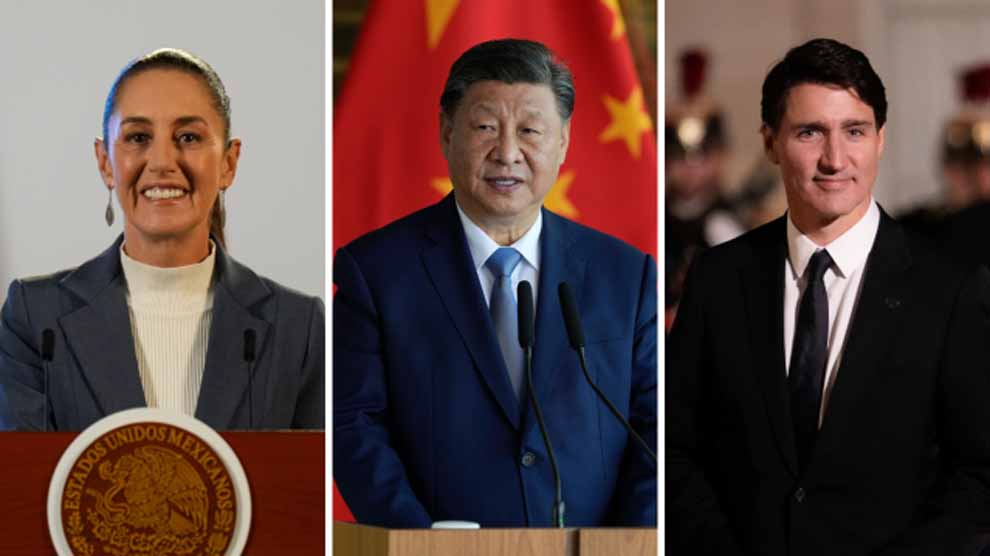
Canada, Mexico, China respond to Trump tariff threats
Officials from Canada, Mexico and China have warned US President-elect Donald Trump’s pledge to impose sweeping tariffs on America’s three largest trading partners could upend the economies of all four countries.
“To one tariff will follow another in response and so on, until we put our common businesses at risk,” Mexico’s President Claudia Sheinbaum said.
Trump vowed on Monday night to introduce 25% tariffs on goods coming from Mexico and Canada and an additional 10% on goods coming from China. He said the duties were a bid to clamp down on drugs and illegal immigration.
Canada’s Prime Minister Justin Trudeau said he spoke to Trump in the hours after the announcement and planned to hold a meeting with Canada’s provincial leaders on Wednesday to discuss a response.
A spokesman for China’s embassy in Washington DC told the BBC: “No-one will win a trade war or a tariff war.”
The international pushback came a day after Trump announced his plans for his first day in office, on 20 January, in a post on his social media website, Truth Social.
Trudeau said his country was prepared to work with the US in “constructive ways”.
“This is a relationship that we know takes a certain amount of working on, and that’s what we’ll do,” Trudeau told reporters.
In a phone call with Trump, Trudeau said the pair discussed trade and border security, with the prime minister pointing out that the number of migrants crossing the Canadian border was much smaller compared with the US-Mexico border.
READ ALSO:
- EFCC to arraign Yahaya Bello today for alleged N110bn fraud
- Court dismisses Sanwo-Olu’s suit to stop EFCC from arresting him after tenure expires
- US University opens 2025 scholarships for international students
Trump’s team declined to confirm the phone call.
But Trump spokesman Steven Cheung added that world leaders had sought to “develop stronger relationships” with Trump “because he represents global peace and stability”.
Mexico’s President Sheinbaum told reporters on Tuesday that neither threats nor tariffs would solve the “migration phenomenon” or drug consumption in the US.
Reading from a letter that she said she would send to Trump, Sheinbaum also warned that Mexico would retaliate by imposing its own taxes on US imports, which would “put common enterprises at risk”.
She said Mexico had taken steps to tackle illegal migration into the US and that “caravans of migrants no longer reach the border”.
The issue of drugs, she added, “is a problem of public health and consumption in your country’s society”.
Sheinbaum, who took office last month, noted that US car manufacturers produce some of their parts in Mexico and Canada.
“If tariffs go up, who will it hurt? General Motors,” she said.
Meanwhile, a spokesman for China’s embassy in Washington, Liu Pengyu, told the BBC that “China-US economic and trade co-operation is mutually beneficial in nature”.
He denied that China allows chemicals used in the manufacture of illegal drugs – including fentanyl – to be smuggled to the US.
“China has responded to US request for verifying clues on certain cases and taken action,” Liu said.
“All these prove that the idea of China knowingly allowing fentanyl precursors to flow into the United States runs completely counter to facts and reality.”
President Joe Biden has left in place the tariffs on China that Trump introduced in his first term, and added a few more of his own.
Currently, a majority of what the two countries sell to each other is subject to tariffs – 66.4% of US imports from China and 58.3% of Chinese imports from the US.
Speaking in the House of Commons in Ottawa, Trudeau told lawmakers that “the idea of going to war with the United States isn’t what anyone wants”.
He called on them to not “panic”, and to work together.
“That is the work we will do seriously, methodically. But without freaking out,” he said.
The leaders of Canadian provinces suggested that they would impose their own tariffs on the US.
“The things we sell to the United States are the things they really need,” Deputy Prime Minister Chrystia Freeland said on Tuesday. “We sell them oil, we sell them electricity, we sell them critical minerals and metals.”
America’s northern neighbour accounted for some $437bn (£347bn) of US imports in 2022, and was the largest market for US exports in the same year, according to US data.
Canada sends about 75% of its total exports to the US.
Doug Ford, the premier of Ontario, Canada’s most populous province, said on Monday the proposed tariff would be “devastating to workers and jobs in both Canada and the US”.
“To compare us to Mexico is the most insulting thing I’ve ever heard,” said Ford.
Ford was echoed by the premiers of Quebec, Saskatchewan and British Columbia, while a post on the X account of Alberta Premier Danielle Smith acknowledged that Trump had “valid concerns related to illegal activities at our shared border”.
The Canadian dollar, the Loonie, has plunged in value since Trump vowed to impose tariffs on Canadian imports come January.
The Canadian dollar dipped below 71 US cents, the lowest level the Loonie has fallen to since May 2020, when Trump threatened to impose tariffs on Canadian goods during his first stint as US president. The Mexican peso fell to its lowest value this year, around 4.8 cents.
Canada, Mexico, China respond to Trump tariff threats
BBC
International
Relief as Israel agrees to ceasefire with Lebanon
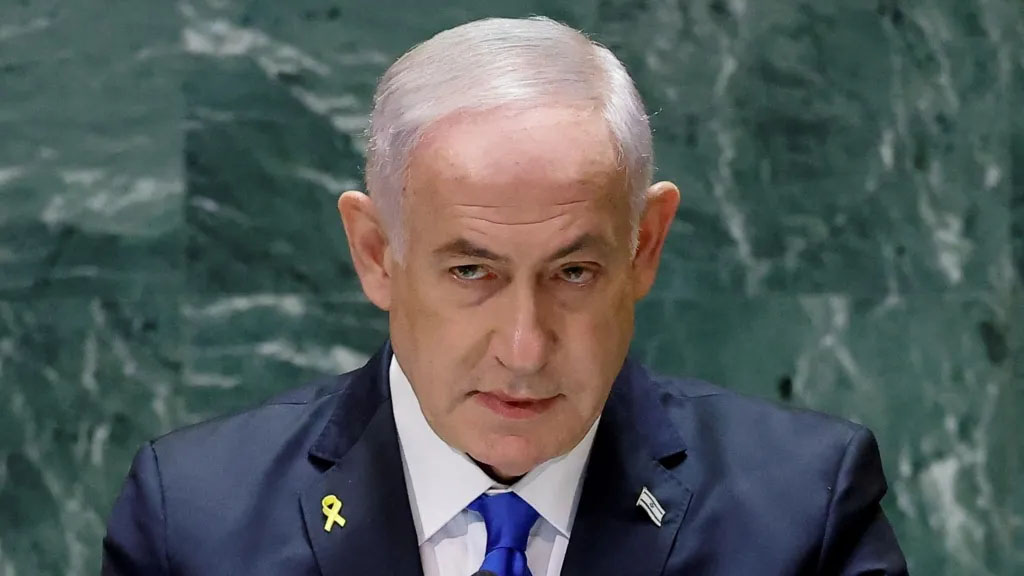
Relief as Israel agrees to ceasefire with Lebanon
Israeli Prime Minister Benjamin Netanyahu has said he will bring a US-brokered proposal for a ceasefire with Hezbollah in Lebanon to his government for approval as soon as Tuesday evening.
He said in a televised address that he would put “a ceasefire outline” to ministers “this evening”.
He however did not say how long the truce would last, noting “the length of the ceasefire depends on what happens in Lebanon”.
But it later learnt that the ceasefire would is for 60 days.
During the period, Hezbollah fighters are expected to retreat 40 kilometres from Israel’s border, with Israeli ground forces withdrawing from Lebanese territory.
“If Hezbollah violates the agreement and attempts to rearm, we will strike,” Netanyahu warned.
Key Israel backer the United States has led ceasefire efforts for Lebanon alongside France.
US President Joe Biden is optimistic the deal will lead to a “permanent cessation of hostilities”.
Biden added that the US would lead another push for a ceasefire in Gaza.
“In full coordination with the United States, we are maintaining full military freedom of action,” Netanyahu said, outlining the seven-front war Israel says it faces in Gaza, the occupied West Bank, Yemen, Iraq, Syria, Lebanon and Iran.
Even as Netanyahu spoke about the ceasefire, the Israeli military carried out multiple strikes on heart of Beirut while the army said some 15 projectiles had entered Israeli airspace from Lebanon.
Demonstrators raise placards and Israeli flags during a protest in front of the Israeli Defence Ministry in the coastal city Tel Aviv on November 26, 2024, against a possible ceasefire with Hezbollah in Lebanon. – Israel’s security cabinet has started discussing a proposed ceasefire deal in its war with Hezbollah in Lebanon, an Israeli official confirmed to AFP on November 26. (Photo by Jack GUEZ / AFP)
The war in Lebanon escalated after nearly a year of limited cross-border exchanges of fire begun by Hezbollah, which said it was acting in support of Hamas after its October 7, 2023 attack on Israel, which sparked the war in Gaza.
The war has killed at least 3,823 people in Lebanon since October 2023, according to the health ministry, most of them since September.
On the Israeli side, the hostilities have killed at least 82 soldiers and 47 civilians, authorities say.
Netanyahu said the ceasefire would allow Israel to focus on “the Iranian threat” and ramp up its fight against Hamas in Gaza.
“With Hezbollah out of the picture, Hamas is left on its own,” he said.
“We will increase our pressure on Hamas and that will help us in our sacred mission of releasing our hostages.”
During last year’s Hamas attack, militants took 251 hostages, of whom 97 are still held in Gaza, including 34 the army has declared dead.
International
Israeli strikes pound central Beirut, suburbs
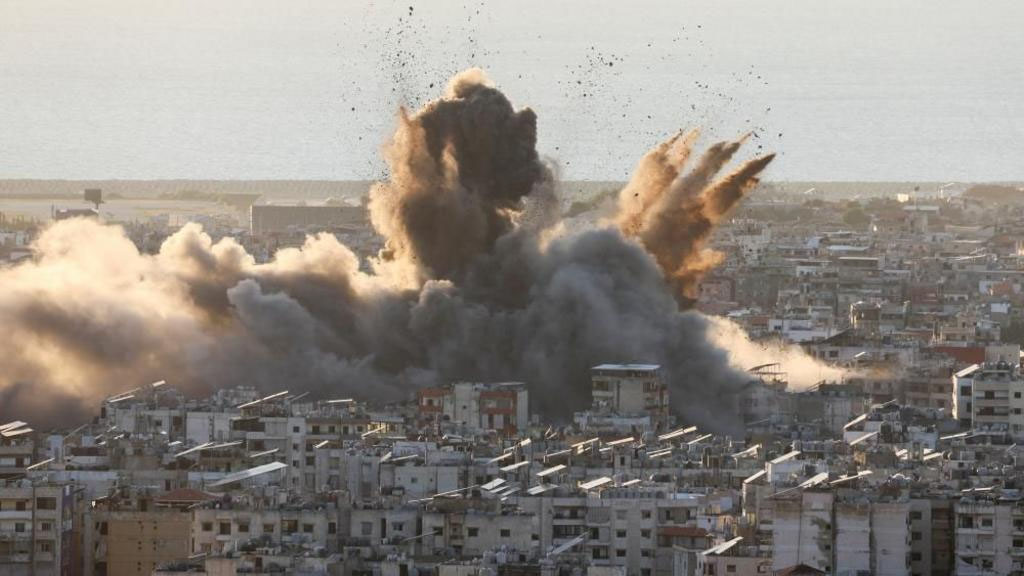
Israeli strikes pound central Beirut, suburbs
BEIRUT: Israeli strikes pounded a densely-populated part of the Lebanese capital and its southern suburbs on Tuesday, hours ahead of an anticipated announcement of a ceasefire ending hostilities between Israel and Lebanese armed group Hezbollah.
A strike on Beirut hit the Noueiri district with no evacuation warning and killed at least one person, Lebanon’s health ministry said in a preliminary toll.
READ ALSO:
- French football star, Paul Pogba’s blackmail trial begin in Paris
- French football star, Paul Pogba’s blackmail trial begin in Paris
- Vigilante arrested in Anambra for robbery
Minutes later, at least 10 Israeli strikes hit Beirut’s southern suburbs. They began approximately 30 minutes after the Israeli military issued evacuation orders for 20 locations in the area, the largest such warning yet.
As the strikes were under way, Israel’s military spokesperson Avichay Adraee said the air force was conducting a “widespread attack” on Hezbollah targets across the city.
Israeli strikes pound central Beirut, suburbs
ARAB NEWS
-

 metro24 hours ago
metro24 hours agoBREAKING: Port Harcourt refinery begins operation
-

 Business3 days ago
Business3 days agoJust in: Dangote refinery reduces petrol price for marketers
-

 metro2 days ago
metro2 days ago40-foot container falls on car in Lagos
-

 Politics3 days ago
Politics3 days ago2027: Lagos Speaker, Obasa joins gov race, may battle Seyi Tinubu, others
-

 Politics2 days ago
Politics2 days agoLagos 2027: Seyi Tinubu campaign team releases his life documentary
-

 International2 days ago
International2 days agoTrump to sack 15,000 transgender officers from U.S. military: Report
-

 Education17 hours ago
Education17 hours agoUS University opens 2025 scholarships for international students
-

 Entertainment2 days ago
Entertainment2 days agoPolygamy best form of marriage for Africa – Okey Bakassi

